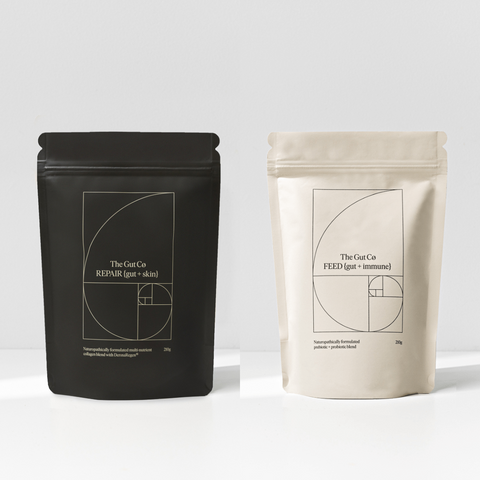5 Ways to Improve Your Gut Health

A thriving digestive system is foundational not only to physical health, but also to mental clarity, glowing skin, immune resilience, and sustained energy. Nurturing a diverse, balanced community of gut microbes is key to unlocking:
-
Robust immune defences
-
Clear, luminous skin
-
Restful, restorative sleep
-
Efficient nutrient absorption
-
Stable mood and cognitive clarity
Explore five science-backed strategies designed to cultivate better gut health—grounded in wholefoods, supplementation, and sustainable habits.
1. Embrace Fermented Foods and Targeted Supplementation
Why Fermented Foods Still Matter in 2025
Modern microbiome research continues to highlight the importance of live fermented foods in enriching your gut ecosystem. Traditional staples—like sauerkraut, kimchi, kefir, kombucha, miso, and tempeh—deliver diverse strains of beneficial bacteria and bioactive compounds that:
-
Support fibre breakdown and nutrient synthesis (notably B vitamins, K2, and short-chain fatty acids)
-
Reinforce mucosal barriers
-
Compete against opportunistic pathogens
Fermented Favourites:
-
Sauerkraut & Kimchi – Loaded with lactic acid bacteria, B vitamins, polyphenols, and natural antioxidants
-
Kefir & Plant-Based Yogurts – Provide multiple strains (e.g. Lactobacillus rhamnosus GG, Bifidobacterium longum) for immune and gut support
-
Kombucha & Tepache – Deliver yeasts and acetic acid bacteria beneficial for microbial variety and metabolic health
-
Tempeh & Miso – Offer Bacillus species and enzymes, supporting protein digestion
Boost Daily Consistency with FEED {gut + immune}
While wholefoods are best, maintaining consistency is easier with a high-quality synbiotic supplement. FEED combines:
-
Prebiotic fibres (PHGG+Acacia)) to nourish your native microbes
-
Clinically supported probiotics with proven gut-colonising activity
-
Vegan vitamin D₃ + K₂ to promote immune–gut communication and resilience
Stir into water, smoothies, or a breakfast bowl to build microbial richness and overall gut stability over time.
2. Restore and Protect Your Gut Barrier
Understanding the Gut Barrier’s Role in Immunity
Your intestinal lining is the body’s largest immune interface—housing ~70% of your immune cells. When this barrier becomes compromised (through stress, pollutants, or ultra-processed diets), it may lead to increased permeability (“leaky gut”), systemic inflammation, and food sensitivities.
Key Nutrients for Gut Repair:
-
L-Glutamine – Fuels enterocytes and supports mucosal regeneration
-
Aloe Vera Extract – Rich in polysaccharides that calm inflammation and support mucus integrity
-
Collagen Peptides – Supply glycine, proline, and hydroxyproline to reinforce tight junctions and connective tissue
REPAIR {gut + skin} with DermaRegen®
REPAIR blends these healing agents with antioxidant-rich compounds for gut and skin synergy:
-
Hydrolysed Collagen – Barrier reinforcement
-
Hyaluronic Acid – Hydrates mucosal and skin layers
-
Astaxanthin, Maqui Berry, Kakadu Plum, Guava leaf – Protect against oxidative stress, provide vitamin A, C and Zinc and other micronutrients
Take once or twice daily, for enhanced absorption and consistent barrier support.
3. Prioritise a Fibre-Forward, Plant-Centric Diet
Microbial Fuel: Dietary Fibre and Polyphenols
Gut microbes thrive on fermentable fibres and polyphenol-rich plant foods. Their fermentation leads to production of short-chain fatty acids (SCFAs)—critical for:
-
Strengthening gut barrier function
-
Modulating inflammation
-
Regulating appetite, insulin sensitivity, and mental clarity
Fibre-Rich Foods to Emphasise:
-
Vegetables: Asparagus, Jerusalem artichokes, leeks, beetroot, sweet potato
-
Fruits: Apples (with skin), kiwifruit, berries, bananas
-
Legumes: Chickpeas, lentils, lupins, black beans
-
Wholegrains: Barley, oats, brown rice, teff
-
Nuts & Seeds: Flaxseeds, hemp seeds, psyllium husk, chia seeds
Don’t forget the polyphenols—found in herbs, green tea, cocoa, berries, and extra virgin olive oil—for additional microbiome nourishment.
4. Limit Processed Foods and Artificial Additives
Emerging data continues to confirm that emulsifiers (e.g. polysorbate-80), artificial sweeteners (e.g. sucralose, aspartame), and preservatives can:
-
Disrupt microbial diversity
-
Increase gut permeability
-
Alter glucose metabolism and trigger inflammation
Gut-Friendly Swaps:
-
Prioritise fresh or minimally processed foods
-
Choose organic, grass-fed or regeneratively raised proteins
-
Prepare your own sauces with herbs, vinegar, olive oil, garlic, and lemon
-
Avoid heavily packaged snacks and sweetened beverages
All TheGut Co supplements remain 100% free from artificial colours, preservatives, fillers, and sweeteners—supporting purity and efficacy.
5. Support the Gut-Brain Axis Through Stress Reduction
Why Mental Calm Equals Gut Calm
The gut-brain axis is a bidirectional communication system. Chronic stress alters gut motility, impacts microbial balance, and increases inflammatory signalling.
Daily Gut-Calming Practices:
-
Mindfulness Meditation: Proven to shift microbial composition in just 6–8 weeks
-
Breathwork Techniques: Box breathing and 4–7–8 breathing regulate vagal tone
-
Movement: Gentle yoga, nature walks, or resistance training reduce cortisol and enhance digestion
-
Prioritise Sleep Hygiene: Regular bedtime, no screens 1 hour before sleep, and magnesium-rich meals
Combined with daily FEED and REPAIR, these practices amplify gut resilience and emotional stability.
The gut is the source of a healthy mind and a body that is strong and full of energy. Robust gut health with thriving good bacteria is the foundation for a strong immune system, beautiful skin, quality sleep, and overall longevity
FEED contains FODMAP friendly pre and probiotics (+vegan vitamin D3+K2) for immune and gut health
REPAIR contains FODMAP friendly collagen, superfoods, glutamine, Aloe vera for glowing skin and a healthy gut lining
- Tags: Gut Health
← Older Post Newer Post →


